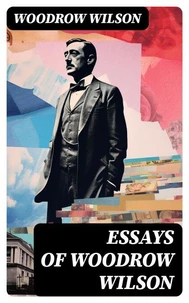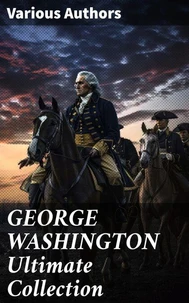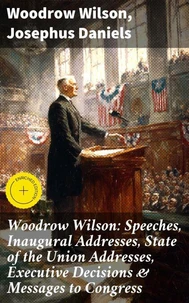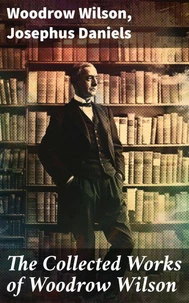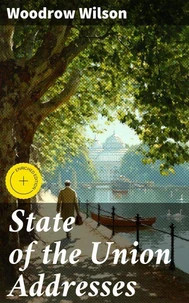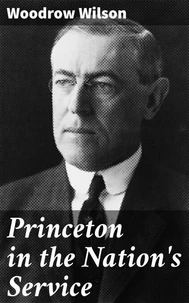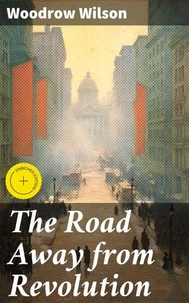Congressional Government
Par :Formats :
Disponible dans votre compte client Decitre ou Furet du Nord dès validation de votre commande. Le format ePub est :
- Compatible avec une lecture sur My Vivlio (smartphone, tablette, ordinateur)
- Compatible avec une lecture sur liseuses Vivlio
- Pour les liseuses autres que Vivlio, vous devez utiliser le logiciel Adobe Digital Edition. Non compatible avec la lecture sur les liseuses Kindle, Remarkable et Sony
 , qui est-ce ?
, qui est-ce ?Notre partenaire de plateforme de lecture numérique où vous retrouverez l'ensemble de vos ebooks gratuitement
Pour en savoir plus sur nos ebooks, consultez notre aide en ligne ici
- Nombre de pages169
- FormatePub
- ISBN859-65--4738580-6
- EAN8596547385806
- Date de parution13/11/2022
- Protection num.Digital Watermarking
- Taille583 Ko
- Infos supplémentairesepub
- ÉditeurDIGICAT
Résumé
In "Congressional Government, " Woodrow Wilson presents a thorough analysis of the United States Congress, offering a critical evaluation of its structure and functions during the late 19th and early 20th centuries. His literary style is both analytical and persuasive, employing clear prose to dissect the complexities of legislative processes and the interplay between the various branches of government.
Wilson's work emerges from the Progressive Era's ethos, reflecting a desire for reform and greater efficiency within the political system, as well as a response to contemporary criticisms of legislative gridlock and partisanship. Woodrow Wilson, a political scientist and historian, later became the 28th President of the United States. His deep understanding of the intricacies of governance was shaped by both his academic background and his observations of the political landscape of his time.
Wilson was profoundly influenced by the challenges posed by an evolving American democracy, which incited him to advocate for a more dynamic and responsive Congressional framework in this foundational work, seeking to reconcile theory with the practice of political power. "Congressional Government" is essential reading for anyone interested in American political theory and the evolution of government.
Wilson's insights remain strikingly relevant today, providing valuable context for contemporary discussions about legislative effectiveness and executive power. This book not only enriches our understanding of Congress but also invites readers to critically engage with the mechanics of democratic governance.
Wilson's work emerges from the Progressive Era's ethos, reflecting a desire for reform and greater efficiency within the political system, as well as a response to contemporary criticisms of legislative gridlock and partisanship. Woodrow Wilson, a political scientist and historian, later became the 28th President of the United States. His deep understanding of the intricacies of governance was shaped by both his academic background and his observations of the political landscape of his time.
Wilson was profoundly influenced by the challenges posed by an evolving American democracy, which incited him to advocate for a more dynamic and responsive Congressional framework in this foundational work, seeking to reconcile theory with the practice of political power. "Congressional Government" is essential reading for anyone interested in American political theory and the evolution of government.
Wilson's insights remain strikingly relevant today, providing valuable context for contemporary discussions about legislative effectiveness and executive power. This book not only enriches our understanding of Congress but also invites readers to critically engage with the mechanics of democratic governance.
In "Congressional Government, " Woodrow Wilson presents a thorough analysis of the United States Congress, offering a critical evaluation of its structure and functions during the late 19th and early 20th centuries. His literary style is both analytical and persuasive, employing clear prose to dissect the complexities of legislative processes and the interplay between the various branches of government.
Wilson's work emerges from the Progressive Era's ethos, reflecting a desire for reform and greater efficiency within the political system, as well as a response to contemporary criticisms of legislative gridlock and partisanship. Woodrow Wilson, a political scientist and historian, later became the 28th President of the United States. His deep understanding of the intricacies of governance was shaped by both his academic background and his observations of the political landscape of his time.
Wilson was profoundly influenced by the challenges posed by an evolving American democracy, which incited him to advocate for a more dynamic and responsive Congressional framework in this foundational work, seeking to reconcile theory with the practice of political power. "Congressional Government" is essential reading for anyone interested in American political theory and the evolution of government.
Wilson's insights remain strikingly relevant today, providing valuable context for contemporary discussions about legislative effectiveness and executive power. This book not only enriches our understanding of Congress but also invites readers to critically engage with the mechanics of democratic governance.
Wilson's work emerges from the Progressive Era's ethos, reflecting a desire for reform and greater efficiency within the political system, as well as a response to contemporary criticisms of legislative gridlock and partisanship. Woodrow Wilson, a political scientist and historian, later became the 28th President of the United States. His deep understanding of the intricacies of governance was shaped by both his academic background and his observations of the political landscape of his time.
Wilson was profoundly influenced by the challenges posed by an evolving American democracy, which incited him to advocate for a more dynamic and responsive Congressional framework in this foundational work, seeking to reconcile theory with the practice of political power. "Congressional Government" is essential reading for anyone interested in American political theory and the evolution of government.
Wilson's insights remain strikingly relevant today, providing valuable context for contemporary discussions about legislative effectiveness and executive power. This book not only enriches our understanding of Congress but also invites readers to critically engage with the mechanics of democratic governance.



